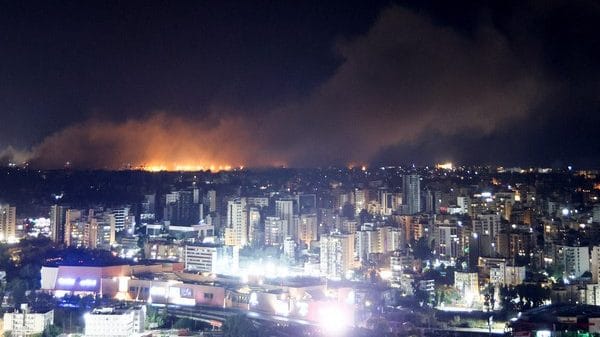Israel has opened a two-front war by initiating a ‘limited’ ground operation along its northern borders. The incursion into southern Lebanon is a predictable outcome following its relentless barrage against Hezbollah leadership in Shi’a-majority suburbs of Beirut. The prime target, and a key success, remains Hassan Nasrallah, the secretary general of Hezbollah. After successfully hacking into Hezbollah’s communication network on 17-18 September, it was only a matter of time before a targeted assassination of Nasrallah was launched. That it succeeded so soon after the pager and walkie-talkie blasts suggests a deeper penetration into Hezbollah’s network than anticipated.
Hezbollah emerged as a Shi’a resistance group fighting Israel’s occupation of south Lebanon. Over time, it became the dominant Shi’a force across Lebanon, attracting adequate support from Iran and the Ba’thist regime in Syria. This dominance culminated in its success during the 2006 war with Israel, which proved extremely bloody for Tel Aviv, with losses far outweighing any identifiable military or security gains. A conventional military faced a lightly armed guerrilla force fighting in its own villages, expertly picking out lumbering tanks with unexpected precision. Doctrines could be written based on that limited war.
In the long run, the perceived ‘victory’ of 2006 would end up costing Hezbollah dearly because it clearly ended up learning incorrect doctrines about unconventional warfare. A guerrilla force fighting in its home territories can only be successful as long as it remains true to its origins—a nimble, agile collection of lightly armed fighters devoted to their land—rather than become an overly centralised large-scale organisation that doubles as a political party. Once Hezbollah became a key player in the Lebanese political landscape, it was only a matter of time before cracks began to emerge.
Once Hezbollah metastasised into a political entity and expanded exponentially, it became easier to find vulnerable members and entice them to infiltrate deeper into the leadership structure. Information gathered over years led to the identification of the supply chain for the exploding pagers and walkie-talkies. And just as with the pattern of assassinations over the years in Iran, a reliable information network was established to keep track of Hezbollah’s leadership, crucial for pinpointing likely locations where Nasrallah would lock himself in. The setback for Hezbollah is enormous but not terminal.
Also read: Hassan Nasrallah’s assassination underlines Israel’s military supremacy. Will it win peace?
It’s not over yet
Decapitation operations against irregular resistance groups have seldom succeeded in history. Such groups tend to reorganise around surviving cells and generally revert to original tactics. Examples are plenty, mostly around Israel’s borders, where such operations have failed against Hezbollah in the past, as well as against Hamas. Despite apparently taking out Mohammed Deif, the Hamas operational mastermind, in July, Israel’s progress in Gaza has been seriously limited. More months have passed since operations against Palestinian resistance groups began than the number of hostages freed by the Israel Defense Forces (IDF). Hezbollah could very well be a diversion.
Over the months, Israeli-Hezbollah armed exchanges remained within tolerable limits. In security parlance, red lines were not crossed. While northern parts of Israel were certainly stressed by rocket barrages, the loss of life was minimal. Hezbollah suffered far more casualties. Therefore, the opening of the northern front by Israel makes little sense other than to perpetuate an environment of conflict rather than seek lasting peace with its neighbours. A state of siege is politically beneficial to the incumbents, who are now also ideologically driven by more than just a desire to maintain power.
Extreme, religiously inspired political parties now participate in Israel’s power structure as never before. Some of the ideological content is so messianic that it is difficult to differentiate from the Islamic counterparts on the far end of the spectrum. A scholarly analysis even considers it an outcome of “extreme monotheistic religiosity.” Such an environment naturally allows Prime Minister Benjamin Netanyahu to equate operations in Gaza and the resultant civilian deaths with a continuation of a blatantly sectarian Biblical narrative. New-age technology and communication platforms have sparked an eruption of such sentiments worldwide, cutting across continents and class boundaries.
Israel is no exception to this phenomenon, which has been studied and commented upon. The major difference from other societies, however, is that Israel exists in a perpetual state of conflict with its neighbours. American largesse and larger Western guilt enable Israel to commit acts of violence that would be diplomatically unacceptable elsewhere. As a result, there is a certain impunity in how Israel deals with its conflicts. The final leg of the American election campaign is as good a time as any to launch another war. US attention is diverted into domestic matters, just as attacking Hezbollah is a grand distraction from the military and security stalemate with Hamas.
Manvendra Singh is a BJP leader, Editor-in-Chief of Defence & Security Alert and Chairman, Soldier Welfare Advisory Committee, Rajasthan. He tweets @ManvendraJasol. Views are personal.
(Edited by Prashant)






